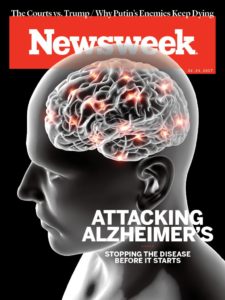
“I’m afraid that even by the stage of very mild dementia, you’ve already lost 70 percent of the key neurons in the memory regions of the brain. Ultimately, we need to start treating people before there are symptoms,” Brigham and Women’s Hospital’s Dr. Reisa Sperling, director of the Center for Alzheimer’s Research and Treatment, told Newsweek.
Recent research developments tell us that the deposition of beta amyloid, the protein responsible for the neural degeneration seen in AD, can precede the onset of symptoms by decades.
Sperling is a primary investigator of the A4 Study, which is currently testing the anti-amyloid drug solanezumab in asymptomatic individuals at elevated risk to develop AD.
Penn Memory Center is one location at which this research is taking place.
“Someday, you won’t have to be demented to be diagnosed with Alzheimer’s disease,” Penn Memory Center Co-Director Dr. Jason Karlawish told Newsweek.